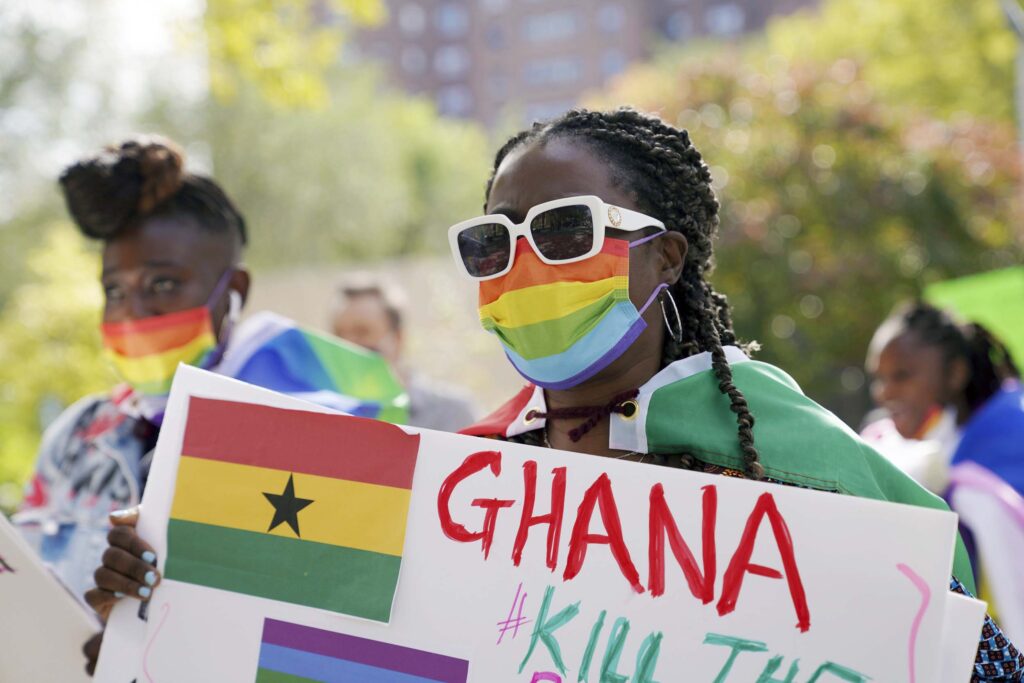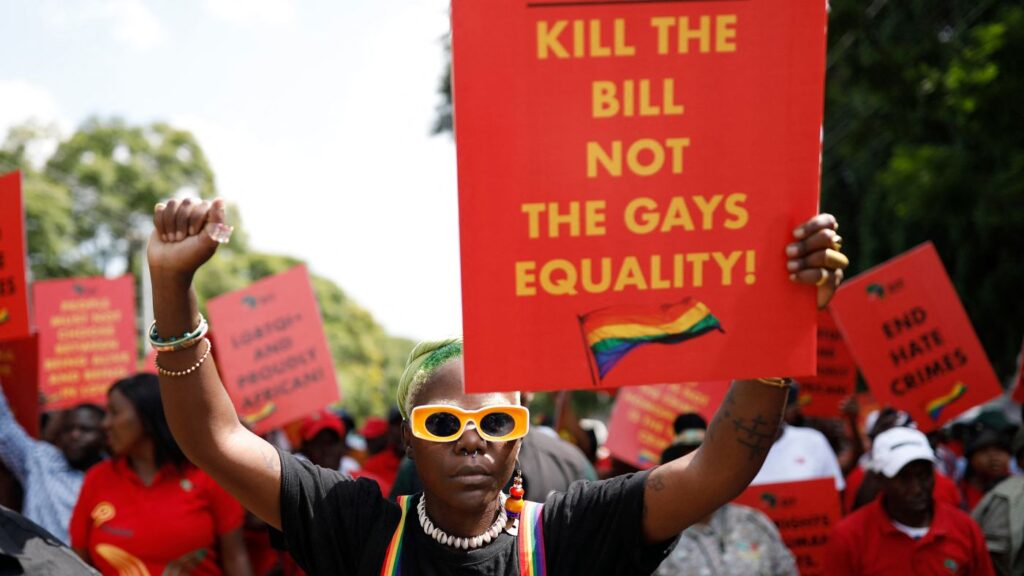What Ghana's Anti-LGBTQ Bill Means for Queer Christians
A new law could criminalize anyone who identifies as LGBTQ

(Image source: Emily Leshner for the Associated Press)
On the afternoon of August 2, 2021, Afia Kua, 22, finished cleaning her apartment in Accra, Ghana. Feeling exhausted, she walked to her bedroom. Lying down, she took out her phone and got on Twitter. While scrolling, she stumbled on a tweet about Ghana’s new anti-LGBTQ bill. For a moment, she was shocked. While reading through the online comments, she felt a growing sense of pain.
“I was very disappointed, less so surprised, and more so discouraged when I realized how [cisgender heteorsexual] Christian communities coalesced around in support of the bill,” Kua says.
Known as the Promotion of Proper Human Sexual Rights and Ghanaian Family Values Bill, the act was introduced into Ghana’s Parliament in August 2021 and was marked as an “urgent” plan by the Parliament’s Speaker who described the bill as a means to “nip the activities of [LGBTQ] groups in the bud.”
The bill seeks to punish, with up to five years in prison, anyone who identifies as part of the LGBTQ community, anyone in a same-gender relationship, and anyone who engages in consensual intercourse with a person of the same gender. The bill also criminalizes any act of LGBTQ rights advocacy with up to ten years in prison. And it would outlaw gender affirmation surgeries and anyone who identifies with a gender not assigned to them at birth. In matters of intersexuality, the bill will enforce doctors to perform cruel surgical procedures on intersex children. And, teachers will face jail time if they do not report LGBTQ students to authorities.
By passing this bill, Ghana would join the list of countries in Africa to criminalize LGBTQ people. 32 nations on the African continent already have harsh anti-LGBTQ laws, with punishments including imprisonment and death by stoning, as is the case in the northern region of Nigeria.
According to a 2021 report by the Ghana Statistical Service, Ghana has a population of 30.8 million – of which 71.3% are Christian: 31.6% of those are Pentecostal and 17.4% are Catholic. While conservative religious views help explain why so many Ghanaians support the new anti-LGBTQ law, many in the country also see homosexuality as un-African and a Western import. Others believe that queer people are possessed by demons. Taken together, countless people within these various groups are in favor of eliminating LGBTQ Ghanaians from the country.
Growing up, Afia Kua, who identifies as both queer and Christian, looked forward to Sundays and going to church with her family. In her first year in university, she joined a Catholic Bible study group. But after two years, she developed an interest in the Anglican Church and became a member. Kua knew she shared a faith with Christians who were either ambivalent or antagonistic about her sexuality. But she never imagined they would seek to criminalize her existence.
For several years, the Anglican church in Ghana has wrestled with its position on LGBTQ issues. Now, the church fully backs the anti-LGBTQ bill.
Over the past couple of decades, Anglican churches across Africa have been breaking away from their mother church in England after it affirmed same-sex marriages and LGBTQ identities. In Ghana, the Anglican Church joined forces with Catholic and other Protestant churches to support the anti-LGBTQ bill, to promote conversion therapy, and to encourage the incarceration of “unrepentant” LGBTQ people.

(Image source: Phill Magakoe for Getty Images)
In September 2021, The Christian Council of Ghana, which includes Anglicans, Methodists, Presbyterians, and others, issued a joint statement that partly read, “We uphold the Bible as our Principal guide and consider the LGBTQI+ in all its forms as unacceptable behavior that our God frowns upon.” After that, more Christian leaders openly expressed their support for the bill. The Catholic Archbishop Philip Naameh told the Associated Press, “We don’t accept murderers. Why should we accept somebody who is doing sex in a sinful way?”
For queer Christians in Ghana, such statements have been traumatizing. While Kua says she didn’t always feel that her faith and sexuality could be aligned when she was younger, she had started to believe that her sexuality and her Christianity were compatible. “I thought being a faithful Christian meant not being affirming of gender and sexual diversity,” she recalls. But, she says, “I began meeting queer, gender expansive, and transgender Christians who have faith I admire, which challenged the stereotypes I had.”
Kua worries that her church’s support for the anti-LGBTQ bill will push her to abandon her faith. But she isn’t willing to renounce religion yet. “I find Jesus compelling, as do many queer, gender expansive, and transgender Ghanaians,” she said. “And I think it’s important not to concede my faith to interpretations of the Bible that are informed by patriarchy and dualism.”
For other queer Ghanaians though, Christian homophobia has led them out of the church. Dariun Sena, who identifies as queer and describes himself as agnostic, only attends church when asked by his parents.
“Before I became agnostic, I was in denial of my sexuality,” he reflects. “I thought it was a phase, though I knew I was different but I convinced myself that everybody experiences same-sex attraction and those feelings go away as we grow.”
By the time Sena turned 16, he knew he wasn’t going through a phase. As his attractions to men persisted, he prayed to change. When nothing changed, he developed suicidal thoughts and resentments against God.
“I asked myself why God created me in the first place as a homosexual if he was opposed to homosexuality and would send us to hell,” he said. “Why wasn’t God taking my homosexual feelings away if he really exists? It didn’t make sense to me. I started questioning a lot of things in the Bible and about Christianity; they didn’t make sense to me so I started looking up to science,” he said.
When he came to terms with his sexuality, Sena detached himself from religion. “The constant hate of my personhood by Christians pushed me away from Christianity,” he said. “Non-religious people were kind, accepting, and tolerant of me.” He now only attends church to prevent his religious parents from learning that he is agnostic.
Sena’s experiences mirror the agony of many LGBTQ Ghanaians in religious homes. He has never come out as gay to his parents, maintaining that he will live happily as long as they have no knowledge of his sexuality.
In October 2021, the Archbishop Justin Welby of Canterbury, the symbolic head of the global Anglican communion, released a statement saying he was “gravely concerned about queer lives in Ghana.” That statement enraged countless Ghanaians. Many decried how the West was still invested in the affairs of Africans and had no place in Ghana’s politics.
Meanwhile, the Catholic church in Ghana voiced support for the anti-LGBTQ bill. Just a few days after the Pope said Catholics should respect LGBTQ people, the Ghanaian Catholic Bishops publicly expressed their support for the anti-LGBTQ bill.
Mark Kwame, who is an Anglo Catholic, was dismissed from his church because of his sexuality. “As if denying me wasn’t enough, my church dismissed me and led a smear campaign against me,” he said.
In 2020, a church member came across a Facebook post Kwame had made about reconciling his sexuality with Christianity. Kwame was active in his church’s choir and the church member reported him to the choir leader, who immediately stripped him of his membership. Kwame, though, continued to attend rehearsals. In response, the choir leader reported him to the priest who publicly humiliated him. “They told me they didn’t want me influencing children,” he said. “They forgot how devoted I was to the church, my service, and every other contribution and [called] me an abomination.”
Kwame remains hopeful that one day the Catholic church will be accepting. “I believe with time the church will change its views and will be more welcoming, though it’s currently living in denial,” he said. “It’s a matter of not shutting the door on dialogue and listening.”
Though Ghana’s anti-LGBTQ bill has been on hold for some time, it has been undergoing recent debate in Ghana’s parliament because the president has not yet voiced his full support. Members of the parliament have given the president a deadline to change his decision. If he does not, the bill will be brought back to the parliament. If two-thirds of the members vote to approve it, the anti-LGBTQ bill will become law.
In late March, U.S. Vice-President Kamala Harris visited Ghana. In a joint press conference with President Akufo-Addo, Harris said the anti-LGBTQ bill would be a violation of human rights. In response, Akufo-Addo mentioned that the legislation was not introduced by his government and said that the Attorney General has intervened to amend the bill. But details about any changes to the bill have not been made public.
As Ghanaians wait to see how the bill will change, or if it will become law, queer Christians in Ghana continue to find ways to try to reconcile their sexuality and their faith within families and communities that reject them.
For Emmanuel Vincent, one of his greatest struggles is helping his family understand his sexuality. “When my father first heard of my being queer, he quickly disowned me without holding back,” he said. “I still wonder what they should have done to me had I still been a child, how they would take me to the church and try to pray the gay away without knowing they would be exposing me to harm.”
Speaking on the state of the community, the director of the organization LGBT+ Rights Ghana, Alex Kofi Donkor, said, “LGBT+ Rights Ghana and other civil society organizations advocating for LGBT+ Rights in Ghana are currently maximizing internal capacities and developing strategies to legally and socially cover community members and activists should the bill be passed, while utilizing available resources (social media campaigns, programs and projects) to create a formidable force of opposition against the bill within the various institutions in Ghana.”
For Kua, faith and hope are what she holds onto most lately. “I can’t advocate, nor can I openly criticize the church for erasing queer lives and supporting our doom,” she said. “The little I can do is hope that the bill isn’t passed.”
While the bill is said to be undergoing a series of modifications, no legislators have said anything official about such changes. But what remains is a constant fear for LGBTQ people in Ghana: the fear of people discovering their sexuality and physically assaulting them for it, the fear of conversion therapies from biased religious institutions, the fear of their families rejecting them, and the fear of their country imprisoning them rather than allowing them to express their love and identities.
Ugonna-Ora Owoh is a journalist based in Lagos, Nigeria. His writing on politics, art, fashion, gender, and sexuality has appeared in the New York Times, VOGUE, Architectural Digest, TeenVOGUE, LGBTQ Nation, VICE, and others.